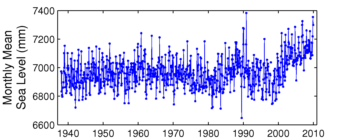The Irish Examiner here reports that Robert Devoy, professor of physical geography at UCC, says the greater wind speeds and flooding in Ireland of the last few days are “what we would expect from a warming climate caused by the impact of humans”.
However, he cites no substantial data to support that. In fact global data on accumulated cyclone energy, hurricanes, droughts, tornadoes, etc. all show no trend, or in many cases even a decline. Yet Devoy claims:
We have had some exceptional events in recent years and these exceptional events are becoming more common.”
How Devoy can claim this is a mystery. Even the alarmist IPCC in its last fifth assessment report stated that there is no link between severe weather and humans.
Prof Devoy also says that “weather patterns had gone outside the natural pattern of weather events and this is a continuation of that” and that “the nature of these storms is changing.”
The nature of storms? What exactly? Prof. Devoy is hiding behind vague statements and doesn’t provide a single measure. He is just saying that storms are different. Scientifically his comments are a dustbin overflowing with rubbish.
He also claims sea level near Dublin is accelerating, claiming that “in the past decade, a regional rise of 2mm-3mm has been recorded by satellite stations and tidal gauges.”
We don’t know if Prof Devoy and the Irish Examiner are oblivious to history, or if they are maliciously trying to mislead the public. Why look only at the past decade? The available data for Dublin from the NOAA go back 80 years and shows very little overall sea level rise trend. Moreover, ten years is by far too short a time to infer a trend.

Source: noaa.gov
Up-to-date chart. Source: www.psmsl.org/stations/432.php
This leads us to wonder why Professor Devoy would make so many outlandish claims. We suppose it has something to do with money. The Irish Examiner quotes Devoy at the end of the article:
He called for further investment in weather monitoring in this country so that scientists can better chart patterns.”
I think the weather is monitored just fine in Ireland with all the satellite and weather station data constantly being collected. What we need are scientists who are not too lazy to go back more than 10 years.
UPDATE: Ed Caryl has provided a link with an updated chart, now posted above. It appears that Professor Devoy’s Dublin sudden sea level rise came in a single year: 2001. In 2001, the gauge changed hands. More research on this could be most interesting.






The data for the last decade is here:
http://www.psmsl.org/data/obtaining/stations/432.php
The problem is that the gauge changed hands in 2001. One would need to have a discussion with the Dublin Harbormaster to find out what is going on. I suspect subsidence at the gauge.
Thanks Ed. Could be interesting to find the cause of that jump in a matter of just couple of years.
Here’s a clue.
http://www.dublinport.ie/Masterplan/draft-masterplan-2011-2040/draft-masterplan-drawings/
The Tern colonies have been moved and replaced by Construction Cranes.
The gauge is somewhere in that inner harbor. There is obviously subsidence from all the additional building and dock mass. The harbor bottom is described as sand over marl.
Obviously he doesn’t understand thermodynamics and fluid mechanics very well.
As Professor Lindzen points out; a warmer planet is one in which the warming is more pronounced outside of the tropics so the energy gradient available to drive storms, etc is less; which has to result in fewer and or less-severe storms overall. That is not falisifed by historical records that indicate the most severe storms during the colder climatic periods.